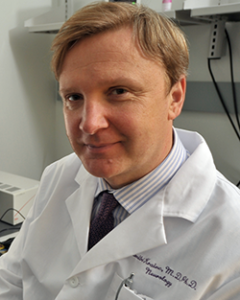This story was originally published in the June 2025 issue of the Breakthroughs newsletter.
Every year at Feinberg, a handful of start-up companies are born from discoveries in the lab. Paperwork is filed for hundreds of inventions and patents; patents are issued and the process for optioning and licensing technology through Northwestern’s Innovations and New Ventures Office (INVO) can be the launching point for scientists to bring their research to commercialization.

But it all starts with a significant discovery. For Dimitri Krainc, MD, PhD, the Aaron Montgomery Ward Professor and chair of the Ken and Ruth Davee Department of Neurology, that discovery was how to improve degradation of aggregation-prone proteins such as mutant huntingtin and α-synuclein by the lysosomal pathway. This finding, published in 2011 in Cell, was the impetus for the start-up company, Vanqua Bio, which is now developing drugs for neurodegenerative diseases.
The paper found that people living with Parkinson’s disease (PD) were deficient in the gene GBA1. Mutations in the gene GBA1, which encodes the enzyme glucocerebrosidase, are a significant genetic risk factor for PD . The paper gave insight into a new therapeutic target to treat PD with the specific gene mutation. The team then developed compounds to activate the gene and target the enzyme.
The study showed that functional loss of glucocerebrosidase in primary cultures or human induced pluripotent stem cell-derived neurons compromises lysosomal protein degradation, causes accumulation of α-synuclein, and results in neurotoxicity through aggregation-dependent mechanisms.
“I didn’t realize right away the potential of the discovery,” Krainc said. Because he had been studying neurodegenerative disease for many years, Krainc knew precision medicine was the way to treat PD. It isn’t possible to treat all PD patients the same way because the underlying mechanisms that lead to PD are different for many individuals, Krainc said.
This new knowledge about GBA1 was key to developing an individualized treatment, and it was also patentable, according to Krainc. Once the patent was in hand, Krainc was able to start negotiating for funding and trying to raise money for the start-up company.
“It is great, intellectually, to be part of the contribution to new knowledge, and it is also really rewarding to see this research translate practically for patients,” Krainc said.
Vanqua Bio was founded in 2019 and Krainc serves as chair of the scientific committee. He estimates that it will take two to three years until patients with a GBA1 mutation and sporadic PD could be treated with the therapy.
Treating the immune system with inverse vaccines
For Stephen Miller, PhD, professor emeritus of Microbiology and Immunology, his path to developing a start-up company began nearly 50 years ago when he did his postdoctoral fellowship at the University of Colorado. In the lab, he studied immunological tolerance — essentially teaching the immune system not to react.

Miller came to Northwestern in 1981, and over the course of his career, he and members of his lab have identified how immune tolerance works on a cellular and molecular level, translating these findings to treatments for a variety of diseases.
One of the key studies that led to Miller’s start-up company, Cour Pharmaceuticals, was published in Gastroenterology in 2021. Miller and colleagues found that inverse vaccines — retraining the immune system to prevent it from attacking healthy cells — for celiac disease were effective.
“This is the first trial demonstrating antigen-specific immune tolerance in autoimmune disease, which represents a novel approach translatable to other immune-mediated diseases,” Miller said.
In the study, Miller and his colleagues designed a biodegradable nanoparticle containing gluten that teaches the immune system that gluten is safe. After treatment with the technology, patients in the trial were able to eat gluten with a substantial reduction in inflammation, while patients in the untreated control group developed inflammation in the small intestine, a characteristic of celiac disease.
“We showed that this treatment method was safe,” Miller said. “There were no reactions with gluten for those who received the infusions. As expected, the placebo patients had inflammatory responses.”
Takeda Pharmaceuticals has purchased the rights to the study, and it is now in phase 2 trials with more than 100 participants, according to Miller. He thinks in perhaps five to 10 years this treatment could be approved and available for people living with celiac disease.
Miller said Northwestern provides exceptional resources for scientists to take their discoveries beyond the lab through collaboration with INVO.
“If you really believe something is going to work, be persistent,” Miller said. “Go to INVO and see what they have to offer.”
Additionally, Miller said it’s important to be highly collaborative with people across the University. He shared his advice to early career investigators: “Bring in bioengineers and other people to help you see things differently. Keep an open mind think about what you’re doing and keep pursuing your end goal.”
Pursuing Research with Personal Inspiration

For Ruchi Gupta, MD, MPH, professor of Pediatrics and director of the Center for Food Allergy & Asthma (CFAAR), it was a personal reason that led her to pursue a start-up company. When her daughter was younger, she dealt with cradle cap and eczema. As a pediatrician who studies how food allergies develop, Gupta was disappointed by the steroids and chemicals prescribed to treat her daughter’s symptoms. She knew she had to create something better.
She started talking with other faculty and physicians at Northwestern and Ann & Robert H. Lurie Children’s Hospital of Chicago and began pulling natural ingredients together to develop a solution that would rebalance the skin’s microbiome. Gupta found a formulation that includes anti-inflammatory properties to restore balance to the scalp and skin.
To take her product to market, Gupta went to INVO to get a patent and funding to conduct preliminary studies of the scalp mask. A pair of studies published in Clinical, Cosmetic and Investigational Dermatology in 2021 tested the product in both children and adult populations.
Participants in the adult study were instructed to liberally apply the topical preparation to their scalp once daily for 14 days, leave it in place for at least seven minutes, and rinse it off in the shower. Participants returned after 14 days of treatment for an in-person follow-up, including a physician scalp assessment, end photograph and exit survey.
For participants who were children, they completed a baseline clinic visit and post-treatment clinic visit. Between the visits, participants were instructed to liberally apply the topical treatment to the scalp, leave it on for five minutes, and rinse it off in the shower, repeating this process two to three times a week for two weeks. Participants also completed surveys at three points in the study.
Overall, the data found that using the novel product clinically reduced the symptoms and disease severity of dry scalp conditions, improved patient reported quality of life within all assessed domains and had no adverse effects in adults or children.
With these clinical studies and a patent, Yobee Care launched in 2023 with four products – a shampoo, conditioner, scalp mask and moisturizing cream. As a physician-scientist, Gupta said the company and their products are meeting a need for effective and natural products to treat atopic skin conditions, and encourages academics to think entrepreneurially, especially women
“It is so incredibly rewarding to get to share Yobee beyond academia,” Gupta said. “I would very much like to support encouraging academics and researchers to think about getting your research out there.”
More resources are available on INVO’s website to learn more about taking a discovery to market. INVO also partners with the Northwestern University Clinical and Translational Sciences Institute to provide Feinberg faculty with innovation, commercialization and entrepreneurship resources.






